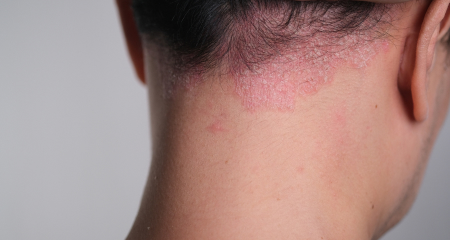
Psoriasis is known for plaques that are itchy, painful, and take a toll on your overall health, self-esteem, and quality of life. When you need comprehensive care for psoriasis, the board-certified dermatologists at Northstar Dermatology in North Richland Hills, Texas, have compassion and years of experience in developing customized treatments that meet your unique skin care needs. To schedule an appointment, use the online booking tool or call the office today.
Psoriasis is an inflammatory condition characterized by the rapid turnover of skin cells, leading to thick, red, and scaly plaques. The immune system releases abnormal signals, or cytokines, that trigger an accelerated production of skin cells. While the exact causes of psoriasis remain under study, a combination of genetic predisposition and environmental triggers—such as infections and certain medications—plays a role. Psoriasis can develop at any age and affects about 1-2% of the population. It’s important to note that psoriasis is not contagious.
Psoriasis can manifest in a range of patterns, from diffuse, widespread redness to smaller, pus-filled bumps on the hands and feet. Approximately 20-30% of individuals with psoriasis may develop psoriatic arthritis, and nail involvement is common, often mistaken for fungal infections.
Plaque Psoriasis (Psoriasis Vulgaris): This most common form typically affects the scalp, elbows, knees, and gluteal cleft (upper buttocks area). Plaques may itch, and in severe cases, can crack and bleed.
Inverse Psoriasis: Affecting skin folds—such as the armpits, belly button, groin, and under the breasts—inverse psoriasis features thinner, non-scaly plaques due to the moisture-prone areas it affects.
Guttate Psoriasis: Characterized by small, raindrop-like spots or plaques that can cover the entire body, guttate psoriasis may appear after a streptococcal infection.
Palmar-Plantar Psoriasis: This form affects the palms and soles, often causing painful fissures that significantly impact daily activities.
Pustular Psoriasis: A rare type of psoriasis marked by small pustules, sometimes accompanied by fever. It may be triggered by infections, medications, pregnancy, or rapid corticosteroid withdrawal. Pustular psoriasis varies widely, from widespread involvement (such as von Zumbusch type) to localized forms, like palmoplantar pustular psoriasis or acrodermatitis continua of Hallopeau.
Erythrodermic Psoriasis: This severe form involves nearly the entire skin surface, leading to widespread inflammation and posing potential medical emergencies due to risks like significant water loss and dangerous cardiac complications.
The following factors do not directly cause psoriasis but may trigger flare-ups in individuals with the condition or a genetic predisposition to it:
Treatment for psoriasis is determined by various factors, including disease severity and a patient’s medical background—such as immune status, history of malignancy, and concurrent medications. At Northstar Dermatology, we emphasize a comprehensive history and physical exam to guide the most appropriate treatment plan.
Fortunately, many treatment options are available, and new, more effective, and targeted therapies continue to emerge.
Topical Therapy
Topical treatments remain foundational in psoriasis care. Topical corticosteroids, available in various strengths, act as anti-inflammatory agents. Common options include hydrocortisone, desonide, triamcinolone, mometasone, betamethasone, and clobetasol. Additional therapies include calcipotriene (a vitamin D analog), tazarotene (a topical retinoid), and steroid-sparing agents like tacrolimus, pimecrolimus, and topical roflumilast (Zoryve).
Phototherapy
Phototherapy involves exposure to specific UV wavelengths, primarily UVB or narrowband UVB, to manage psoriasis symptoms.
Systemic Medications
For moderate to severe psoriasis unresponsive to other treatments or cases too extensive for topical treatment alone, oral or injectable systemic medications may be used. Oral options include cyclosporine, methotrexate, or Otezla. Injectable biologics, which target specific immune pathways, include infliximab (Remicade), etanercept (Enbrel), adalimumab (Humira), certolizumab (Cimzia), secukinumab (Cosentyx), ixekizumab (Taltz), guselkumab (Tremfya), tildrakizumab (Ilumya), risankizumab (Skyrizi), and ustekinumab (Stelara), among others. These therapies require lab monitoring and follow-up due to their immune-modulating effects.
For a personalized treatment plan, please reach out or book an appointment with us online today.
